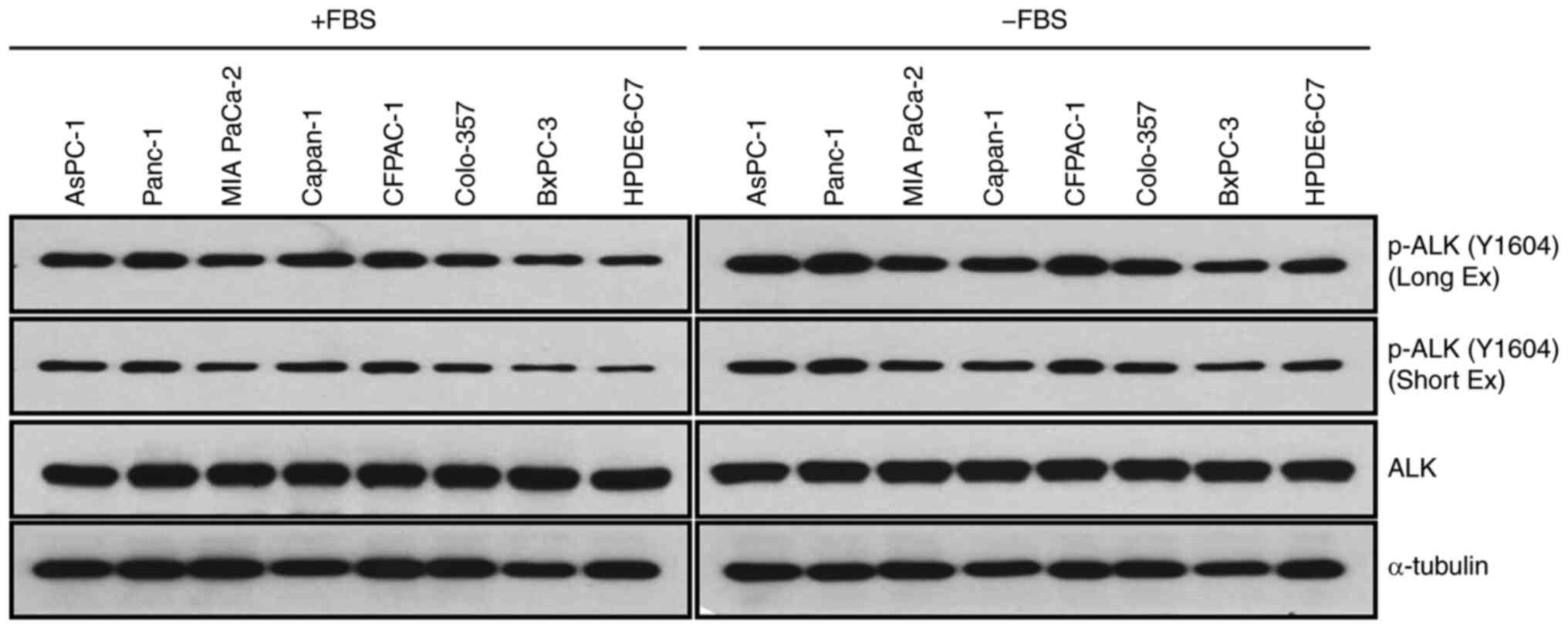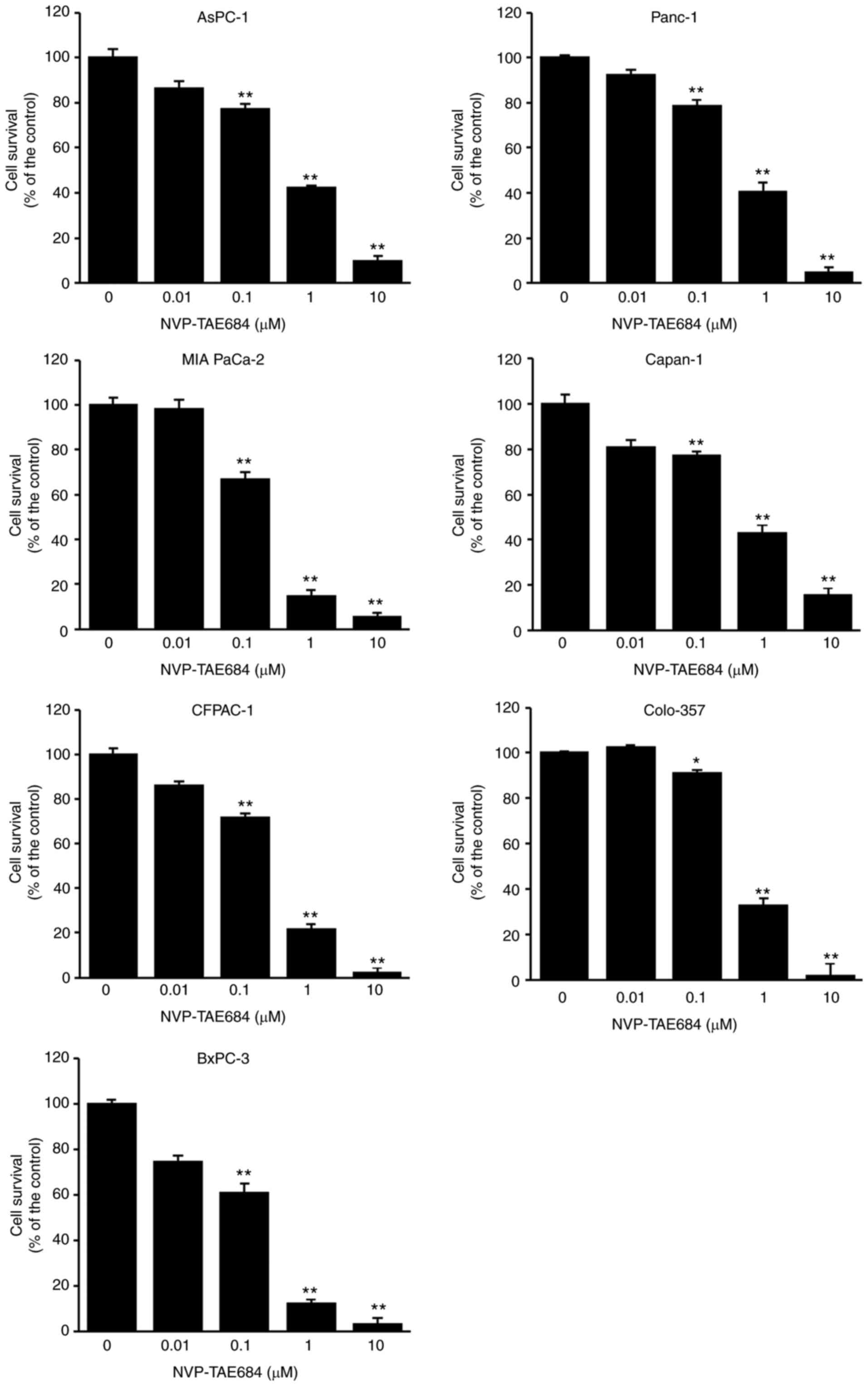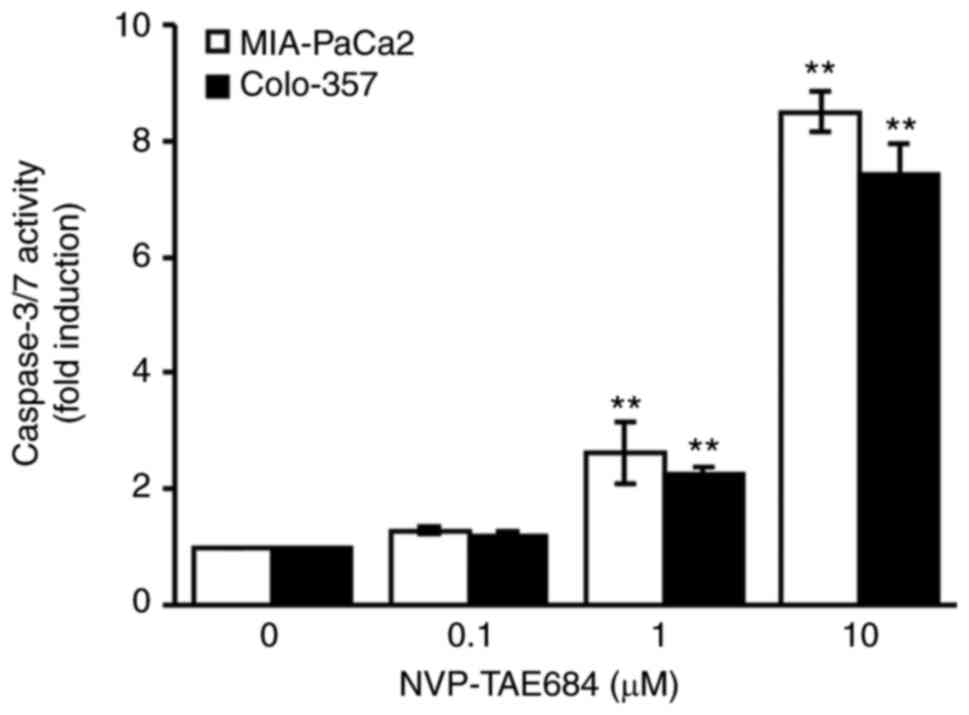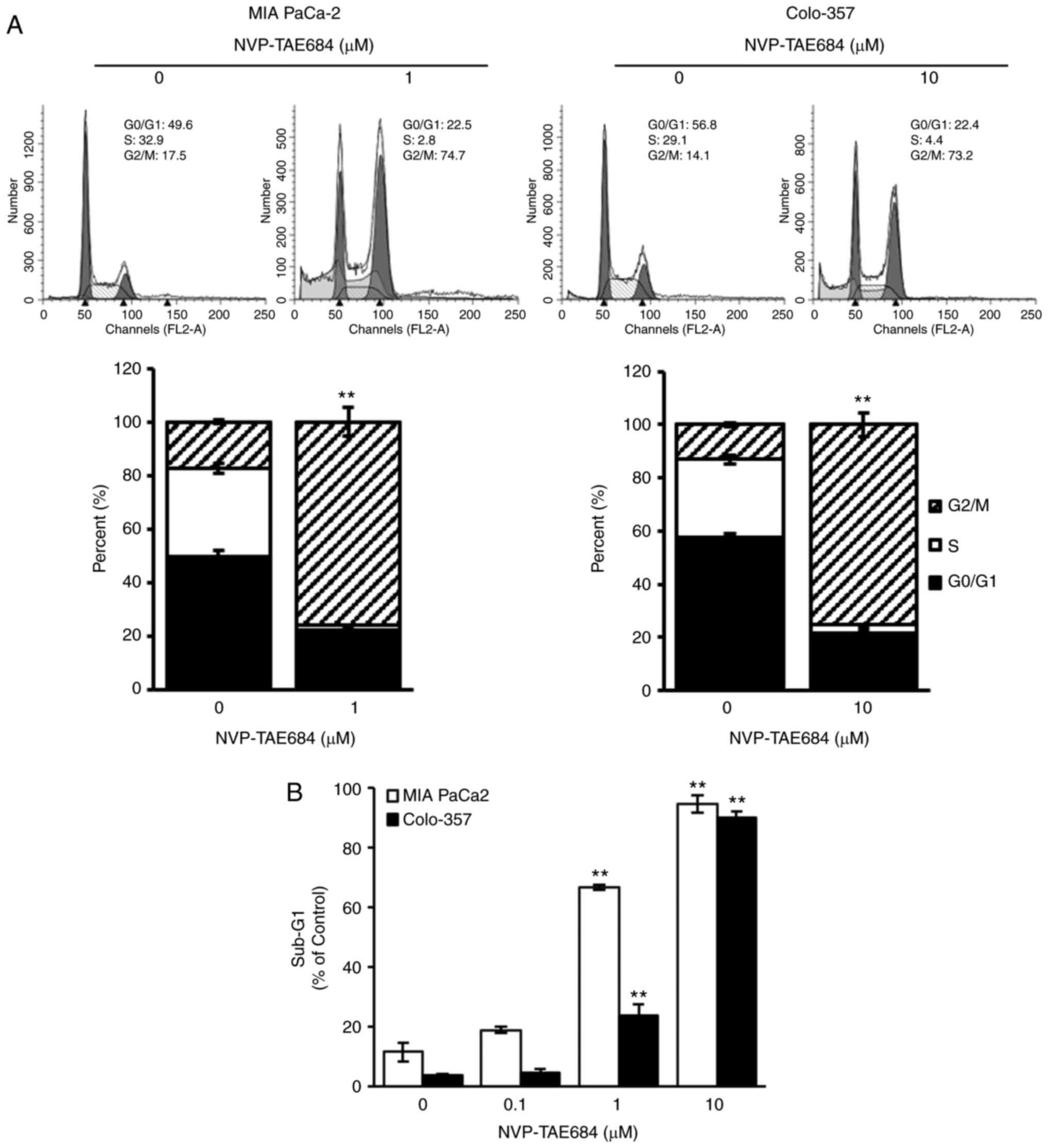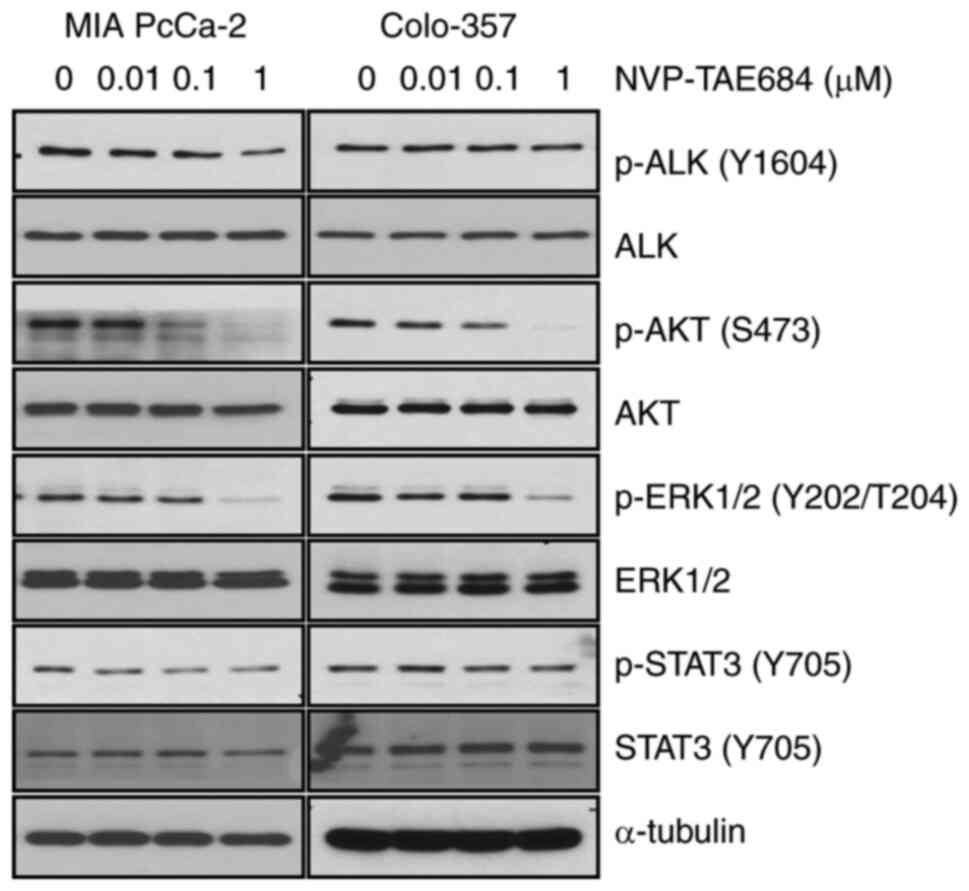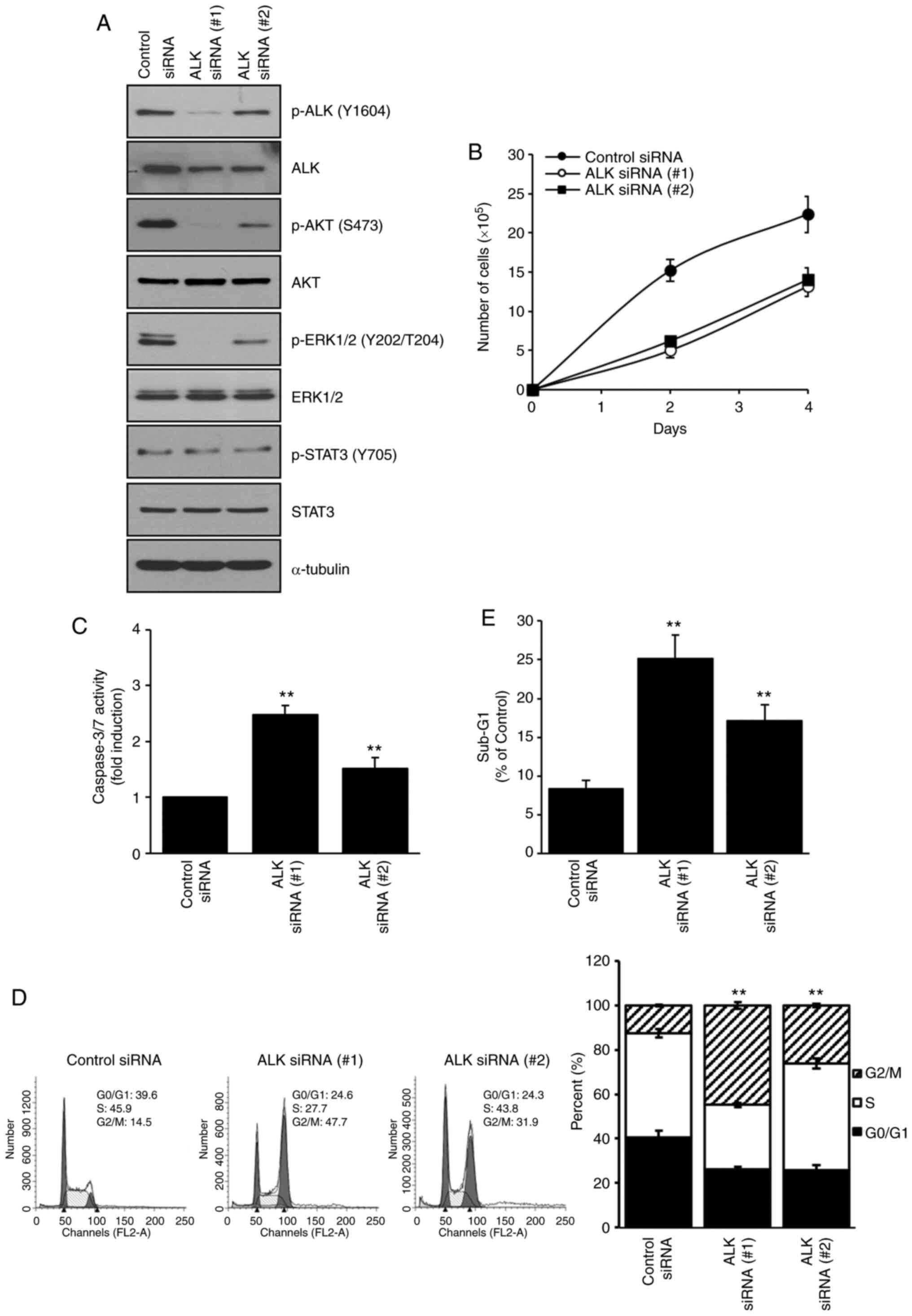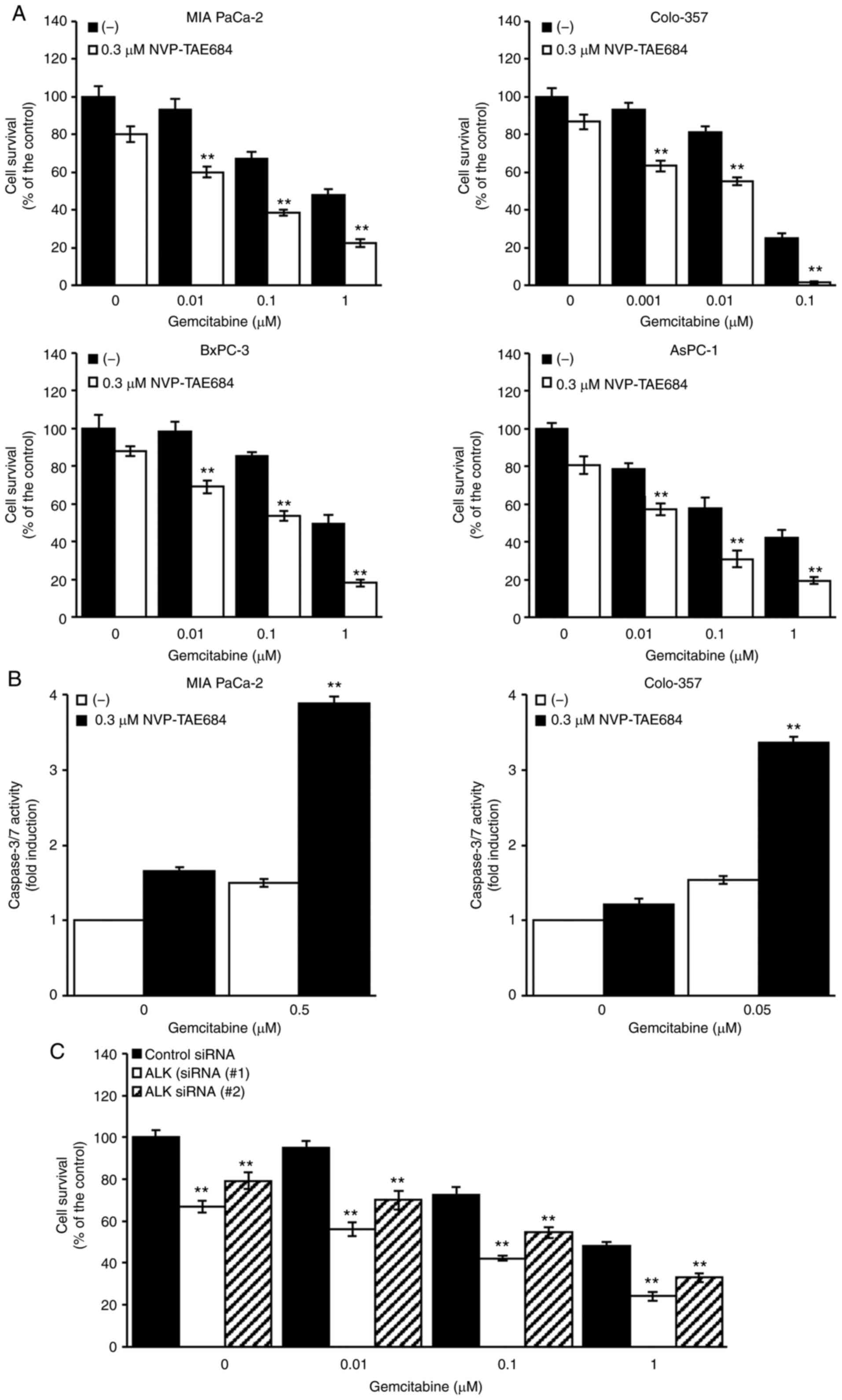|
1
|
Siegel RL, Miller KD and Jemal A: Cancer
statistics, 2018. CA Cancer J Clin. 68:7–30. 2018. View Article : Google Scholar : PubMed/NCBI
|
|
2
|
Bray F, Ferlay J, Soerjomataram I, Siegel
RL, Torre LA and Jemal A, Siegel RL, Miller KD and Jemal A: Cancer
statistics, 2018. CA Cancer J Clin. 68:394–424. 2018. View Article : Google Scholar : PubMed/NCBI
|
|
3
|
Ryan DP, Hong TS and Bardeesy N:
Pancreatic adenocarcinoma. N Engl J Med. 371:1039–1049. 2014.
View Article : Google Scholar : PubMed/NCBI
|
|
4
|
Kamisawa T, Wood LD, Itoi T and Takaori K:
Pancreatic cancer. Lancet. 388:73–85. 2016. View Article : Google Scholar : PubMed/NCBI
|
|
5
|
Oberstein PE and Olive KP: Pancreatic
cancer: Why is it so hard to treat? Therap Adv Gastroenterol.
6:321–327. 2013. View Article : Google Scholar : PubMed/NCBI
|
|
6
|
Moore M: Activity of gemcitabine in
patients with advanced pancreatic carcinoma. A review. Cancer.
78:633–638. 1996. View Article : Google Scholar : PubMed/NCBI
|
|
7
|
Carmichael J, Fink U, Russell RC, Spittle
MF, Harris AL, Spiessi G and Blatter J: Phase II study of
gemcitabine in patients with advanced pancreatic cancer. Br J
Cancer. 73:101–105. 1996. View Article : Google Scholar : PubMed/NCBI
|
|
8
|
Casper ES, Green MR, Kelsen DP, Heelan RT,
Brown TD, Flombaum CD, Trochanowski B and Tarassoff PG: Phase II
trial of gemcitabine (2,2-difluorodeoxycytidine) in patients with
adenocarcinoma of the pancreas. Invest New Drugs. 12:29–34. 1994.
View Article : Google Scholar : PubMed/NCBI
|
|
9
|
Roskoski R Jr: Anaplasmic lymphoma kinase
(ALK): Structure, oncogenic activation and pharmacological
inhibition. Pharmacol Res. 68:68–94. 2013. View Article : Google Scholar : PubMed/NCBI
|
|
10
|
Yan HH, Jung KH, Son MK, Fang Z, Kim SJ,
Ryu YL, Kim J, Kim MH and Hong SS: Crizotinib exhibits antitumor
activity by targeting ALK signaling not c-MET in pancreatic cancer.
Oncotarget. 5:9150–9168. 2014. View Article : Google Scholar : PubMed/NCBI
|
|
11
|
Jamshed MB, Munir F, Shahid N, Sadiq U,
Muhammad SA, Ghanem NB, Zhong H, Li X and Zhang Q: Antitumor
activity and combined inhibitory effect of ceritinib with
gemcitabine in pancreatic cancer. Am J Physiol Gastrointest Liver
Physiol. 318:G109–G119. 2019. View Article : Google Scholar : PubMed/NCBI
|
|
12
|
Wang Y, Wang L..Guan S, Cao W, Wang H,
Chen Z, Zhao Y, Yu Y, Zhang H, Pang JC, et al: Novel ALK inhibitor
AZD3463 inhibits neuroblastoma growth by overcoming crizotinib
resistance and inducing apoptosis. Sci Rep. 6:194232016. View Article : Google Scholar : PubMed/NCBI
|
|
13
|
Chiarle R, Voena C, Ambrogio C, Piva R and
Inghirami G: The anaplastic lymphoma kinase in the phathogenesis of
cancer. Nat Rev Cancer. 8:11–23. 2008. View
Article : Google Scholar : PubMed/NCBI
|
|
14
|
Mossé YP, Wood A and Maris JM: Inhibition
of ALK signaling for cancer therapy. Clin Cancer Res. 15:5609–5614.
2009. View Article : Google Scholar : PubMed/NCBI
|
|
15
|
Galkin AV, Melnick JS, Kim S, Hood TL, Li
N, Li L, Xia G, Steensma R, Chopiuk G, Jiang J, et al:
Identification of NVP-TAE684, a potent, selective and efficacious
inhibitor of NPM-ALK. Proc Natl Acad Sci USA. 104:270–275. 2007.
View Article : Google Scholar : PubMed/NCBI
|
|
16
|
McDermott U, Iafrate AJ, Gray NS, Shioda
T, Classon M, Maheswaran S, Zhou W, Choi HG, Smith SL, Dowell L, et
al: Genomic alternations of anaplastic lymphoma kinase may
sensitize tumors to anaplastic lymphoma kinase inhibitors. Cancer
Res. 68:3389–3395. 2008. View Article : Google Scholar : PubMed/NCBI
|
|
17
|
Li Y, Ye X, Liu J, Zha J and Pei L:
Evaluation of EML4-ALK fusion proteins in non-small cell lung
cancer using small molecule inhibitors. Neoplasia. 13:1–11. 2011.
View Article : Google Scholar : PubMed/NCBI
|
|
18
|
Van Roosbroeck K, Cools J, Dierickx D,
Thomas J, Vandenberghe P, Stul M, Delabie J, De Wolf-Peeters C,
Marynen P and Wlodarska I: ALK-Positive large B-cell lymphomas with
cryptic SEC31A-ALK and NPM1-ALK fusions. Haematologica. 95:509–513.
2010. View Article : Google Scholar : PubMed/NCBI
|
|
19
|
Cerchietti L, Damm-Welk C, Vater I,
Klapper W, Harder L, Pott C, Yang SN, Reiter A, Siebert R, Melnick
A and Woessmann W: Inhibition of anaplastic lymphoma kinase (ALK)
activity provides a therapeutic approach for CLTC-ALK-positive
human diffuse large B cell lymphomas. PLoS One. 6:e184362011.
View Article : Google Scholar : PubMed/NCBI
|
|
20
|
Duijkers FA, Gaal J, Meijerink JP,
Admiraal P, Pieters R, de Krijger RR and van Noesel MM: Anaplastic
lymphoma kinase (ALK) inhibitor response in neuroblastoma is highly
correlated with ALK mutation status, ALK mRNA and protein levels.
Cell Oncol (Dordr). 34:409–417. 2011. View Article : Google Scholar : PubMed/NCBI
|
|
21
|
Ye S, Zhang J, Shen J, Gao Y, Li Y, Choy
E, Cote G, Harmon D, Mankin H, Gray NS, et al: NVP-TAE684 reverses
multidrug resistance (MDR) in human osteosarcoma by inhibiting
P-glycoprotein (PGP1) function. Br J Pharmacol. 173:613–626. 2016.
View Article : Google Scholar : PubMed/NCBI
|
|
22
|
Dai Y, Wei Q, Schwager C, Hanne J, Zhou C,
Herfarth K, Rieken S, Lipson KE and Debus J: Oncogene addition and
radiation oncology: effect of radiotherapy with photons and carbon
ions in ALK-EML4 translocated NSCLC. Radiat Oncol. 13:12018.
View Article : Google Scholar : PubMed/NCBI
|
|
23
|
Huang XX, Xie FF, Hou LJ, Chen XX, Ou RY,
Yu JT, Qiu JG, Zhang WJ, Jiang QW, Yang Y, et al: Crizotinib
synergizes with cisplatin in preclinical models of ovarian cancer.
Am J Transl Res. 9:1667–1679. 2017.PubMed/NCBI
|
|
24
|
Liu Z, Jiang L, Li Y, Xie B, Xie J, Wang
Z, Zhou X, Jiang H, Fang Y, Pan H and Han W: Cyclosporine A
sensitizes lung cancer cells to crizotinib through inhibition of
the Ca2+/calcineurin/erk pathway. EBioMedicine.
42:326–339. 2019. View Article : Google Scholar : PubMed/NCBI
|
|
25
|
Alam MW, Borenäs M, Lind DE,
Cervantes-Madris D, Umapathy G, Palmer RH and Hallberg B:
Alectinib, an anaplastic lymphoma kinase inhibitor, abolishes ALK
activity and growth in ALK-positive neuroblastoma cells. Front
Oncol. 9:5792019. View Article : Google Scholar : PubMed/NCBI
|
|
26
|
Osawa T, Davies D and Hartley JA:
Mechanism of cell death resulting from DNA interstrand
cross-linking in mammalian cells. Cell Dealth Dis. 2:e1872011.
View Article : Google Scholar
|
|
27
|
Stark GR and Taylor WR: Analyzing the G2/M
checkpoint. Methods Mol Biol. 280:51–82. 2004.PubMed/NCBI
|
|
28
|
Duong HQ, Hwang JS, Kim HJ, Kang HJ, Seong
YS and Bae I: Aldehyde dehydrogenase 1A1 confers intrinsic and
acquired resistance to gemcitabine in human pancreatic
adenocarcinoma MIA PaCa-2 cells. Int J Oncol. 41:855–861. 2012.
View Article : Google Scholar : PubMed/NCBI
|
|
29
|
Duong HQ, Hwang JS, Kim HJ, Seong YS and
Bae I: BML-275, an AMPK inhibitor, induces DNA damage, G2/M arrest
and apoptosis in human pancreatic cancer cells. Int J Oncol.
41:2227–2236. 2012. View Article : Google Scholar : PubMed/NCBI
|
|
30
|
Furukawa T, Duquid WP, Rosenberg L,
Viallet J, Galloway DA and Tsao MS: Long-term culture and
immortalization of epithelial cells from normal adult human
pancreatic ducts transfected vy the E6E7 gene of human papilloma
virus 16. Am J Pathol. 148:1763–1770. 1996.PubMed/NCBI
|
|
31
|
Duong HQ, Kim HJ, Kang HJ, Seong YS and
Bae I: ZSTK474, a PI3K inhibitor, suppresses proliferation and
sensitizes human pancreatic adenocarcinoma cells to gemcitabine.
Oncol Rep. 27:182–188. 2012.PubMed/NCBI
|
|
32
|
Duong HQ, Hong YB, Kim JS, Lee HS, Yi YW,
Kim YJ, Wang A, Zhao W, Cho CH, Seong YS and Bae I: Inhibition of
checkpoint kinase 2 (CHK2) enhances sensitivity of pancreatic
adenocarcinoma cells to gemcitabine. J Cell Mol Med. 17:1261–1270.
2013. View Article : Google Scholar : PubMed/NCBI
|
|
33
|
You KS, Yi YW, Kwak SJ and Seong YS:
Inhibition of RPTOR overcomes resistance to EGFR inhibition in
triple-negative breast cancer cells. Int J Oncol. 52:828–840.
2018.PubMed/NCBI
|
|
34
|
Laiho M and Latonen L: Cell cycle control,
DNA damage checkpoints and cancer. Ann Med. 35:391–397. 2003.
View Article : Google Scholar : PubMed/NCBI
|
|
35
|
Lobrich M and Jeggo PA: The impact of a
negligent G2/M checkpoint on genomic instability and cancer
induction. Nat Rev Cancer. 7:861–869. 2007. View Article : Google Scholar : PubMed/NCBI
|
|
36
|
Davies KD, Le AT, Theodoro MF, Skokan MC,
Aisner DL, Berge EM, Terracciano LM, Cappuzzo F, Incarbone M,
Roncalli M, et al: Identifying and targeting ROS1 gene fusions in
non-small cell lung cancer. Clin Cancer Res. 18:4570–4579. 2012.
View Article : Google Scholar : PubMed/NCBI
|
|
37
|
Lovly CM, Heuckmann JM, de Stanchina E,
Chen H, Thomas RK, Liang C and Pao W: Insights into ALK-driven
cancers revealed through development of novel ALK tyrosine kinase
inhibitors. Cancer Res. 71:4920–4931. 2011. View Article : Google Scholar : PubMed/NCBI
|















